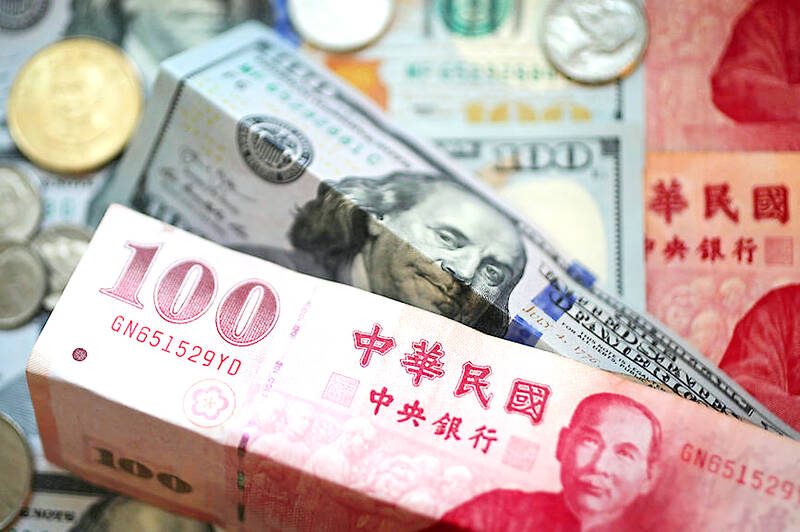President William Lai’s (賴清德) plan to further encourage Taiwanese businesses to invest in the US and increase the country’s defense budget is a good move after US President Donald Trump outlined his plan to impose tariffs on other countries, academics said.
After Trump on Thursday announced plans to impose reciprocal tariffs on exports from countries that he said have unfair trade policies toward the US, Lai held a national security meeting and laid out a plan to expand Taiwanese investment in the US and increase defense spending to 3 percent of GDP this year.
For the fiscal year 2025, the Cabinet had previously earmarked NT$647 billion (US$19.74 billion) for national defense, accounting for 2.45 percent of GDP.

Photo: CNA
“President Lai has the right idea in terms of how to manage his relationship with President Trump,” Hofstra University law professor Julian Ku (古舉倫) said.
Trump looks for allies with two key traits — the ability to manage defense with as little reliance on the US as possible, and the capacity to invest and trade with the US on terms that Trump feels are “fair,” he said.
“Lai’s goal should be to get Trump to think of Taiwan in a way that is similar to the way he currently thinks about Japan,” Ku said, adding that Lai’s proposals address both concerns that Trump is likely to raise.
However, Lai needs to deliver something tangible, given his administration cannot force Taiwanese companies to invest in the US and does not control the defense budget, which must be approved by the legislature, Ku said.
“A commitment to dramatically increase Taiwan purchases of US energy, including [liquefied natural gas] LNG, would demonstrate goodwill and get headlines,” he said, adding that such a move would show to the US that Lai has the power to offer tangible benefits that are easy to explain and understand.
Japanese Prime Minister Shigeru Ishiba met Trump for the first time on Friday last week, showing goodwill by committing to substantial investments in the US and making additional LNG purchases, which some analysts viewed as a successful diplomatic move.
Ku the following day wrote on X that Taipei should follow suit by buying as much US LNG as possible and suggested that it could be a way for the government to remind Trump that the nation would not be able to pay for the LNG if China blockades Taiwan.
Washington-based think tank Brookings Institution nonresident senior fellow Richard Bush called Lai’s plan “good will initiatives,” but said he was uncertain how the Trump administration would respond to them.
“More importantly, I suspect that, like the first Trump administration, this one does not have a coherent approach to Taiwan policy, at least as yet,” he said. “I personally believe that for the United States to make public complaints about the policies of a good friend like Taiwan is not necessarily conducive to effective bilateral cooperation based on shared interests.”

The manufacture of the remaining 28 M1A2T Abrams tanks Taiwan purchased from the US has recently been completed, and they are expected to be delivered within the next one to two months, a source said yesterday. The Ministry of National Defense is arranging cargo ships to transport the tanks to Taiwan as soon as possible, said the source, who is familiar with the matter. The estimated arrival time ranges from late this month to early next month, the source said. The 28 Abrams tanks make up the third and final batch of a total of 108 tanks, valued at about NT$40.5 billion

Two Taiwanese prosecutors were questioned by Chinese security personnel at their hotel during a trip to China’s Henan Province this month, the Mainland Affairs Council (MAC) said yesterday. The officers had personal information on the prosecutors, including “when they were assigned to their posts, their work locations and job titles,” MAC Deputy Minister and spokesman Liang Wen-chieh (梁文傑) said. On top of asking about their agencies and positions, the officers also questioned the prosecutors about the Cross-Strait Joint Crime-Fighting and Judicial Mutual Assistance Agreement, a pact that serves as the framework for Taiwan-China cooperation on combating crime and providing judicial assistance, Liang

A group from the Taiwanese Designers in Australia association yesterday represented Taiwan at the Midsumma Pride March in Melbourne. The march, held in the St. Kilda suburb, is the city’s largest LGBTQIA+ parade and the flagship event of the annual Midsumma Festival. It attracted more than 45,000 spectators who supported the 400 groups and 10,000 marchers that participated this year, the association said. Taiwanese Designers said they organized a team to march for Taiwan this year, joining politicians, government agencies, professionals and community organizations in showing support for LGBTQIA+ people and diverse communities. As the first country in Asia to legalize same-sex

MOTIVES QUESTIONED The PLA considers Xi’s policies toward Taiwan to be driven by personal considerations rather than military assessment, the Epoch Times reports Chinese President Xi Jinping’s (習近平) latest purge of the Chinese People’s Liberation Army (PLA) leadership might have been prompted by the military’s opposition to plans of invading Taiwan, the Epoch Times said. The Chinese military opposes waging war against Taiwan by a large consensus, putting it at odds with Xi’s vision, the Falun Gong-affiliated daily said in a report on Thursday, citing anonymous sources with insight into the PLA’s inner workings. The opposition is not the opinion of a few generals, but a widely shared view among the PLA cadre, the Epoch Times cited them as saying. “Chinese forces know full well that